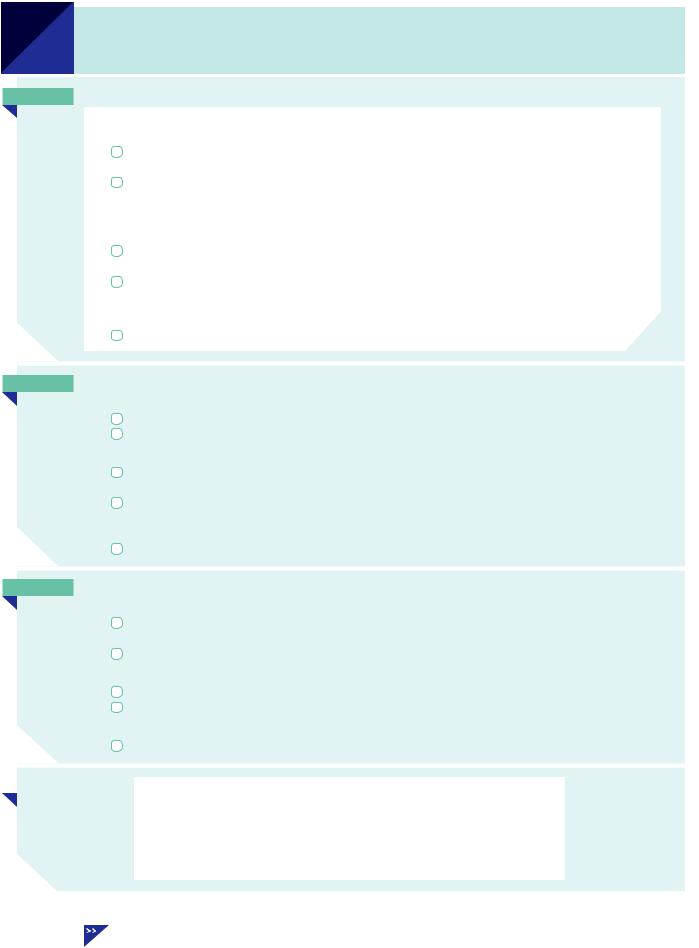
- •Contents
- •Thanks
- •To the student
- •To the teacher
- •3 Present continuous and present simple 1 (I am doing and I do)
- •10 Present perfect continuous and simple (I have been doing and I have done)
- •11 how long have you (been) … ?
- •12 for and since when … ? and how long … ?
- •13 Present perfect and past 1 (I have done and I did)
- •14 Present perfect and past 2 (I have done and I did)
- •15 Past perfect (I had done)
- •16 Past perfect continuous (I had been doing)
- •17 have and have got
- •18 used to (do)
- •19 Present tenses (I am doing / I do) for the future
- •20 I’m going to (do)
- •21 will and shall 1
- •22 will and shall 2
- •23 I will and I’m going to
- •24 will be doing and will have done
- •26 can, could and (be) able to
- •27 could (do) and could have (done)
- •28 must and can’t
- •29 may and might 1
- •30 may and might 2
- •31 have to and must
- •32 must mustn’t needn’t
- •33 should 1
- •34 should 2
- •35 I’d better … it’s time …
- •36 would
- •39 if I knew … I wish I knew …
- •40 if I had known … I wish I had known …
- •41 wish
- •42 Passive 1 (is done / was done)
- •43 Passive 2 (be done / been done / being done)
- •44 Passive 3
- •45 it is said that … he is said to … he is supposed to …
- •46 have something done
- •47 Reported speech 1 (he said that …)
- •48 Reported speech 2
- •49 Questions 1
- •52 Question tags (do you? isn’t it? etc.)
- •53 Verb + -ing (enjoy doing / stop doing etc.)
- •54 Verb + to … (decide to … / forget to … etc.)
- •55 Verb (+ object) + to … (I want you to …)
- •56 Verb + -ing or to … 1 (remember, regret etc.)
- •57 Verb + -ing or to … 2 (try, need, help)
- •58 Verb + -ing or to … 3 (like / would like etc.)
- •59 prefer and would rather
- •60 Preposition (in/for/about etc.) + -ing
- •61 be/get used to … (I’m used to …)
- •63 there’s no point in -ing, it’s worth -ing etc.
- •64 to … , for … and so that …
- •65 Adjective + to …
- •66 to … (afraid to do) and preposition + -ing (afraid of -ing)
- •67 see somebody do and see somebody doing
- •68 -ing clauses (He hurt his knee playing football.)
- •69 Countable and uncountable 1
- •70 Countable and uncountable 2
- •71 Countable nouns with a/an and some
- •74 the 2 (school / the school etc.)
- •75 the 3 (children / the children)
- •77 Names with and without the 1
- •78 Names with and without the 2
- •79 Singular and plural
- •80 Noun + noun (a bus driver / a headache)
- •81 -’s (your sister’s name) and of … (the name of the book)
- •82 myself/yourself/themselves etc.
- •83 a friend of mine my own house on my own / by myself
- •84 there … and it …
- •85 some and any
- •87 much, many, little, few, a lot, plenty
- •90 all every whole
- •91 each and every
- •92 Relative clauses 1: clauses with who/that/which
- •94 Relative clauses 3: whose/whom/where
- •95 Relative clauses 4: extra information clauses (1)
- •96 Relative clauses 5: extra information clauses (2)
- •97 -ing and -ed clauses (the woman talking to Tom, the boy injured in the accident)
- •98 Adjectives ending in -ing and -ed (boring/bored etc.)
- •99 Adjectives: a nice new house, you look tired
- •100 Adjectives and adverbs 1 (quick/quickly)
- •102 so and such
- •104 quite, pretty, rather and fairly
- •105 Comparative 1 (cheaper, more expensive etc.)
- •106 Comparative 2 (much better / any better etc.)
- •107 Comparative 3 (as … as / than)
- •108 Superlative (the longest / the most enjoyable etc.)
- •109 Word order 1: verb + object; place and time
- •110 Word order 2: adverbs with the verb
- •111 still any more yet already
- •112 even
- •114 in case
- •116 as (as I walked … / as I was … etc.)
- •117 like and as
- •119 during for while
- •121 at/on/in (time)
- •122 on time and in time at the end and in the end
- •123 in/at/on (position) 1
- •124 in/at/on (position) 2
- •125 in/at/on (position) 3
- •126 to, at, in and into
- •127 in/on/at (other uses)
- •129 Noun + preposition (reason for, cause of etc.)
- •130 Adjective + preposition 1
- •131 Adjective + preposition 2
- •132 Verb + preposition 1 to and at
- •134 Verb + preposition 3 about and of
- •135 Verb + preposition 4 of/for/from/on
- •136 Verb + preposition 5 in/into/with/to/on
- •137 Phrasal verbs 1 Introduction
- •138 Phrasal verbs 2 in/out
- •139 Phrasal verbs 3 out
- •142 Phrasal verbs 6 up/down
- •143 Phrasal verbs 7 up (1)
- •144 Phrasal verbs 8 up (2)
- •145 Phrasal verbs 9 away/back
- •Additional exercises
- •Study guide
- •Key to Exercises
- •Key to Additional exercises (see page 302)
- •Key to Study guide
- •Index

Unit
65 Adjective + to …
Ahard to understand, interesting to talk to etc.
Compare sentences (a) and (b):
|
|
|
(a) It is hard to understand |
him |
. |
|
|||||
|
|
|
|
|
|
|
|
|
|
|
|
James doesn’t speak clearly. |
|
|
|
|
|
|
|
|
|
||
|
|
|
(b) |
|
|
is hard to understand. |
|
||||
|
|
He |
|
||||||||
|
|
|
|
||||||||
|
|
|
|
|
|
|
|
||||
Sentences (a) and (b) have the same meaning. Note that we say: |
|
||||||||||
He is hard to understand. (not He is hard to understand him) |
|
||||||||||
We use other adjectives in the same way. For example: |
|
|
|
|
|
||||||
easy |
nice |
safe |
|
|
cheap |
exciting |
impossible |
||||
dificult |
good |
dangerous |
|
expensive |
interesting |
|
|||||
Do you think it is safe to drink this water?
Do you think this water is safe to drink? (not to drink it)
The exam questions were very hard. It was impossible to answer them. The exam questions were very hard. They were impossible to answer. (not to answer them)
Nicola has lots of interesting ideas. It’s interesting to talk to her. Nicola is interesting to talk to. (not to talk to her)
We also use this structure with adjective + noun:
This is a dificult question to answer. (not to answer it)
Bnice of (you) to …
We say ‘It’s nice of somebody to …’ :
 It was nice of you to take me to the airport. Thank you very much.
It was nice of you to take me to the airport. Thank you very much.
We use other adjectives in the same way. For example:
kind generous careless silly stupid inconsiderate unfair typical
It’s silly of Ruth to give up her job when she needs the money.
I think it was unfair of him to criticise me.
Csorry to … / surprised to … etc.
You can use adjective + to … to say how somebody reacts to something:
 I’m sorry to hear that your mother isn’t well.
I’m sorry to hear that your mother isn’t well.
We use other adjectives in the same way. For example:
glad pleased relieved surprised amazed sad disappointed
Was Julia surprised to see you?
It was a long and tiring journey. We were glad to get home.
D You can use to … ater the next / the last / the only / the first / the second (etc.):
The next train to arrive at platform 4 will be the 10.50 to Liverpool.
Everybody was late except me. I was the only one to arrive on time.
If I have any more news, you will be the first to know. (= the first person to know.)
EYou can say that something is sure/likely/bound to happen:
Carla is a very good student. She’s bound to pass the exam. (= she is sure to pass)
It’s possible I’ll win the lottery one day, but it’s not likely to happen. (= it’s not probable)
130 |
afraid/interested/sorry Unit 66 it … Unit 84C enough and too + adjective Unit 103 |

Exercises
65.1 Write these sentences in another way, beginning as shown.
1 |
It’s hard to understand some things. |
Some things are hard to understand. |
2 |
It was dificult to open the window. |
The window |
3 |
It’s impossible to translate some words. |
Some words |
4 |
It’s expensive to maintain a car. |
A |
5 |
It’s not safe to eat this meat. |
This |
6 |
It’s easy to get to my house from here. |
My |
65.2 Make sentences from the words in brackets.
1 I couldn’t answer the question. (dificult question / answer)
2 It’s a very common mistake. (easy mistake / make)
3 I like living in this town. (great place / live)
4I wonder why she said that. (strange thing / say)
It was a difficult question to answer
It’s
65.3 Complete the sentences. Choose from the box.
1 |
It’s nice of Dan and Kate to invite |
me to their party. |
|
|
to hear |
||
2 |
I’ve been travelling a long time. Now I’m |
to be back home. |
to help |
||||
3 |
I heard about Tom’s accident. I was relieved |
that he’s OK. |
to invite |
||||
4 |
It was nice |
to remember my birthday. |
|
|
to make |
||
5 |
Let me know if you need any assistance. I’d be very pleased |
you. |
not |
||||
6 |
I thought James was about 25. I was |
to discover he was 40. |
of you |
||||
7 |
It was inconsiderate of our neighbours |
so much noise. |
silly |
||||
8 |
My interview went well. I was disappointed |
to be ofered the job. |
amazed |
||||
9 |
It’s |
of me to worry so much about things that are not important. |
glad |
||||
|
the last |
the only |
|
||||
65.4 |
Complete the sentences. Use: the first the second |
|
|||||
1 |
Nobody spoke before me. I was the |
first person to |
speak. |
|
|
||
2Everybody else arrived before Paul. Paul was
3Emily passed the exam. All the other students failed. Emily
4I complained to the manager. Another customer had already complained. I
Unit
65
.
.
.
.
5Neil Armstrong walked on the moon in 1969. Nobody had done this before him. Neil Armstrong
65.5Complete the sentences using the words in brackets and a suitable verb.
1 Carla is a very good student.
|
(she / bound / pass) She’s bound to pass |
the exam. |
2 |
I’m not surprised you’re tired ater your trip. |
|
|
(you / bound / tired) |
ater such a long journey. |
3 |
Andy has a very bad memory. |
|
|
(he / sure / forget) |
anything you tell him. |
4 |
I don’t think you’ll need an umbrella. |
|
|
(it / not / likely / rain) |
. |
5 |
The holidays begin this weekend. |
|
|
(there / sure / be) |
a lot of trafic on the roads. |
131

Unit
66
A
to … (afraid to do) and preposition + -ing (afraid of -ing)
afraid to (do) and afraid of (do)ing
I am afraid to do something =
I don’t want to do it because it is dangerous or the result could be bad.
This part of town is dangerous. People are afraid to walk here at night. (= they don’t walk here at night because it is dangerous)
James was afraid to tell his parents what had happened.
(= he didn’t tell them because he thought they would be angry)
I am afraid of something happening =
I am afraid that something bad will happen.
The path was icy, so we walked very carefully. We were afraid of falling. (= we were afraid that we would fall – not afraid to fall)
I don’t like dogs. I’m always afraid of being bitten.
(= I’m afraid that I will be bitten – not afraid to be bitten)
So, you are afraid to do something because you are afraid of something happening as a result: I was afraid to go near the dog because I was afraid of being bitten.
Binterested in (do)ing and interested to (do)
I’m interested in doing something = I’m thinking of doing it, I would like to do it:
Let me know if you’re interested in joining the club. (not to join)
I tried to sell my car, but nobody was interested in buying it. (not to buy)
I was interested to hear/see/know something = it was interesting for me. For example:
I was interested to hear that Tanya let her job. (= I heard this and it was interesting for me)
I’ll ask Mike for his opinion. I would be interested to know what he thinks. (= it would be interesting for me to know what he thinks)
This structure is the same as surprised to … / glad to … etc. (see Unit 65C): I was surprised to hear that Tanya let her job.
Csorry for … and sorry to …
We use sorry for (doing) to apologise for something:
I’m sorry for shouting at you yesterday. (not sorry to shout)
You can also say:
I’m sorry I shouted at you yesterday.
We use sorry to … to say that we regret something that happens:
I’m sorry to hear that Nicky lost her job. (not sorry for)
I’ve enjoyed my stay here. I’ll be sorry to leave.
We also say ‘I’m sorry to …’ to apologise at the time we do something:
I’m sorry to bother you, but I need to ask you a question.
D |
We say: |
I want to (do), I’d like to (do) |
but |
I’m thinking of (do)ing |
|
||||
|
|
I hope to (do) |
|
I dream of (do)ing |
|
|
I failed to (do) |
|
I succeeded in (do)ing |
|
|
I allowed them to (do) |
|
I prevented them from (do)ing |
|
|
I plan to (do) |
|
I’m looking forward to (do)ing |
|
|
I promised to (do) |
|
I insisted on (do)ing |
|
|
|
|
|
|
Verb + to … Units 54–55 Verb + preposition + -ing Unit 62 sorry to … Unit 65C |
132 |
Adjective + preposition Units 130–131 sorry about/for Unit 130 |

Exercises
66.1 Write sentences using afraid to … or afraid of -ing.
1 The streets here are not safe at night. (a lot of people / afraid / go / out)
2 We walked very carefully along the icy path. (we / afraid / fall)
3I don’t usually carry my passport with me. (I / afraid / lose / it)
4I thought she would be angry if I told her what had happened. (I / afraid / tell / her)
5We ran to the station.
(we / afraid / miss / our train)
6In the middle of the film there was a very horrifying scene. (we / afraid / look)
7The vase was very valuable, so I held it carefully. (I / afraid / drop / it)
8If there’s anything you want to know, you can ask me. (don’t / afraid / ask)
9I was worried because we didn’t have much petrol. (I / afraid / run out of petrol)
66.2Complete the sentences using interested in … or interested to … . Choose from these verbs:
buy |
hear |
know |
look |
start |
study |
Unit
66
1 |
I’m trying to sell my car, but nobody is |
interested in buying it. |
2 |
Nicola is |
her own business. |
3 |
I saw Joe recently. You’ll be |
that he’s getting married soon. |
4 |
I didn’t enjoy school. I wasn’t |
. |
5I went to a public meeting to discuss the plans for a new road. I was how people felt about the project.
6 Paul doesn’t enjoy sightseeing. He’s not |
at old buildings. |
66.3 Complete the sentences using sorry for … or sorry to … . Use the verb in brackets.
1 |
I’m sorry to bother |
you, but I need to ask you something. (bother) |
|
2 |
We were |
that you can’t come to the wedding. (hear) |
|
3 |
I’m |
bad things about you. I didn’t mean what I said. (say) |
|
4 |
It’s a shame Alan is leaving the company. I’ll be |
him go. (see) |
|
5 |
I’m |
so much noise last night. |
(make) |
66.4 Complete the sentences in each group using the verb in brackets.
1 |
a |
We wanted to leave |
the building. |
|
|
|
b We weren’t allowed |
the building. |
|
(leave) |
|
|
c |
We were prevented |
the building. |
|
|
|
|
|
|||
2 |
a |
Sam and Chris hoped |
the problem. |
|
|
|
b Sam failed |
the problem. |
|
(solve) |
|
|
c |
Chris succeeded |
the problem. |
|
|
|
|
|
|||
3 |
a |
I’m thinking |
away next week. |
|
|
|
b I’m planning |
away next week. |
|
|
|
|
(go) |
||||
|
c |
I’d like |
away next week. |
||
|
|
|
|||
|
|
|
|
|
|
|
d I’m looking forward |
away next week. |
|
||
4 |
a |
Helen wanted |
me lunch. |
|
|
|
b Helen insisted |
me lunch. |
|
|
|
|
(buy) |
||||
|
c |
Helen promised |
me lunch. |
||
|
|
|
|||
|
d Helen wouldn’t dream |
me lunch. |
|
|
|
Additional exercise 27 (page 318) |
|
|
133 |
||
